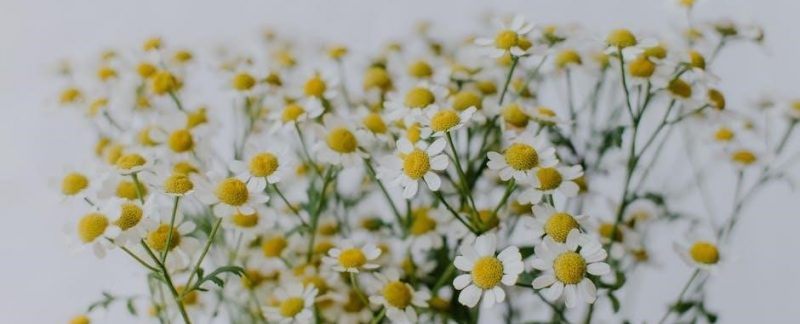Herbal tea, a soothing infusion of plants, fruits, and flowers, offers a caffeine-free alternative to traditional tea, promoting relaxation and well-being with its diverse flavors and health benefits․
What is Herbal Tea?
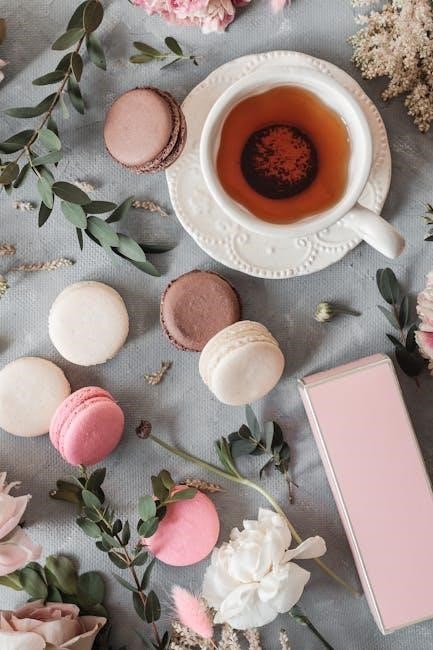
Herbal tea, also known as tisane, is a caffeine-free beverage made from the infusion of fruits, flowers, herbs, and plants․ Unlike traditional tea, it doesn’t contain leaves from the Camellia sinensis plant․ Instead, it uses ingredients like chamomile, peppermint, and hibiscus, offering unique flavors and potential health benefits․ Herbal teas are enjoyed for their soothing properties, aroma, and taste, making them a popular choice for those seeking a relaxing, naturally caffeine-free drink․ They can be consumed hot or iced, depending on preference, and are often tailored to address specific wellness needs or simply to unwind․
A Brief History of Herbal Tea
Herbal tea has ancient roots, dating back thousands of years to early civilizations in Egypt, China, and Rome․ These cultures used plant infusions for medicinal, spiritual, and social purposes․ Chinese herbalism, in particular, laid the foundation for modern herbal tea practices, emphasizing health and longevity․ In Europe, herbal remedies were popularized by monasteries and apothecaries․ Today, herbal teas remain a global tradition, cherished for their diverse flavors and wellness benefits, bridging the past with contemporary health-conscious lifestyles while preserving centuries-old traditions․
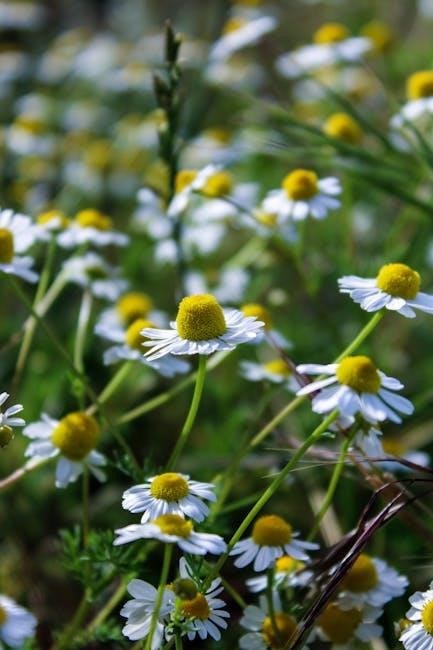
Benefits of Herbal Tea
Herbal teas offer a rich array of health benefits, from boosting immunity to reducing stress, improving digestion, and aiding sleep, all while providing refreshing, caffeine-free enjoyment․
Physical Health Benefits
Herbal teas provide numerous physical health benefits, enhancing immune function and reducing inflammation․ Certain teas, like green tea, support cardiovascular health by improving cholesterol levels․ Others promote healthy digestion, alleviating issues like bloating and indigestion․ Additionally, herbal teas are rich in antioxidants, which combat free radicals and protect against chronic diseases․ Regular consumption may also aid in lowering blood pressure and managing blood sugar levels․ Overall, these natural infusions offer a holistic approach to improving and maintaining physical well-being without the need for caffeine or artificial ingredients․
Mental and Emotional Health Benefits
Herbal teas offer profound mental and emotional health benefits, providing natural stress relief and promoting relaxation․ Chamomile tea, for instance, is renowned for its calming effects, reducing anxiety and improving sleep quality․ Lavender and passionflower teas also soothe the mind, easing restlessness and fostering a sense of tranquility․ The antioxidants and calming compounds in these infusions help lower stress hormones, such as cortisol, while uplifting blends like lemon balm and rosehip tea enhance mood and mental clarity․ Regular consumption can lead to improved emotional balance, making herbal teas a holistic approach to mental well-being․ They are not a replacement for professional care but can complement a healthy lifestyle․
Herbal Tea for Weight Management
Herbal teas can support weight management by boosting metabolism, suppressing appetite, and enhancing fat burning․ Green tea, rich in catechins like EGCG, accelerates metabolism and aids in fat oxidation․ Peppermint tea stimulates digestion, reducing cravings, while yerba mate increases energy expenditure․ Hibiscus tea helps regulate blood sugar levels, preventing overeating․ Rooibos tea, caffeine-free and high in antioxidants, supports overall health without contributing to weight gain․ Incorporating these teas into a balanced diet and regular exercise routine can promote sustainable weight loss․ Optimal brewing times and amounts vary, so experimenting is key to maximize benefits and enjoyment․
Herbal Tea and Improved Sleep Quality
Herbal teas can significantly enhance sleep quality by promoting relaxation and calming the mind․ Chamomile tea, known for its soothing effects, reduces stress and anxiety, making it easier to fall asleep․ Lavender tea, with its tranquilizing properties, helps improve sleep duration and depth․ Valerian root tea is another potent option, as it contains compounds that regulate sleep patterns and reduce restlessness․ These teas are best consumed 30–60 minutes before bedtime․ Optimal brewing involves steeping for 5–7 minutes and serving without additives to maximize their natural benefits․ Incorporating these teas into a bedtime routine can lead to more restful and rejuvenating sleep․
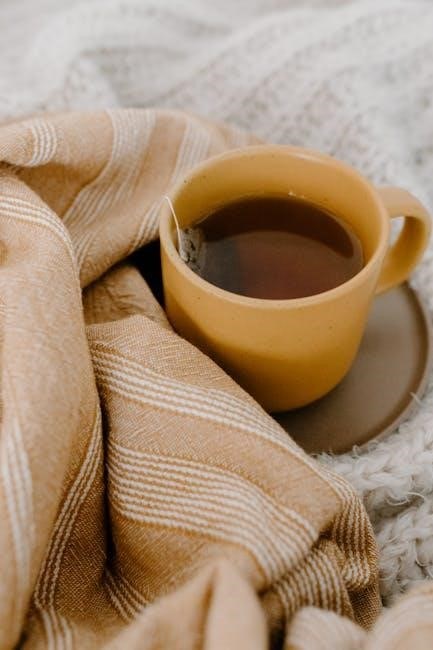
How to Prepare the Perfect Cup of Herbal Tea
Brew the perfect cup by using fresh, filtered water, heating it to the optimal temperature, and steeping for the recommended time to release flavors and benefits;
Materials Needed for Brewing
To brew herbal tea, you’ll need a few essential tools: a clean teapot, a kettle for boiling water, an infuser or strainer, and a cup․ Use fresh, filtered water for the best flavor and to avoid impurities․ A tea infuser is perfect for loose herbs, while a strainer works well for catching leaves when pouring․ Preheating the teapot ensures even temperature distribution․ For convenience, some opt for herbal tea bags, which simplify the process․ High-quality, organic herbs are recommended for optimal taste and health benefits․ These simple materials are key to crafting a perfect cup every time․
Step-by-Step Brewing Instructions
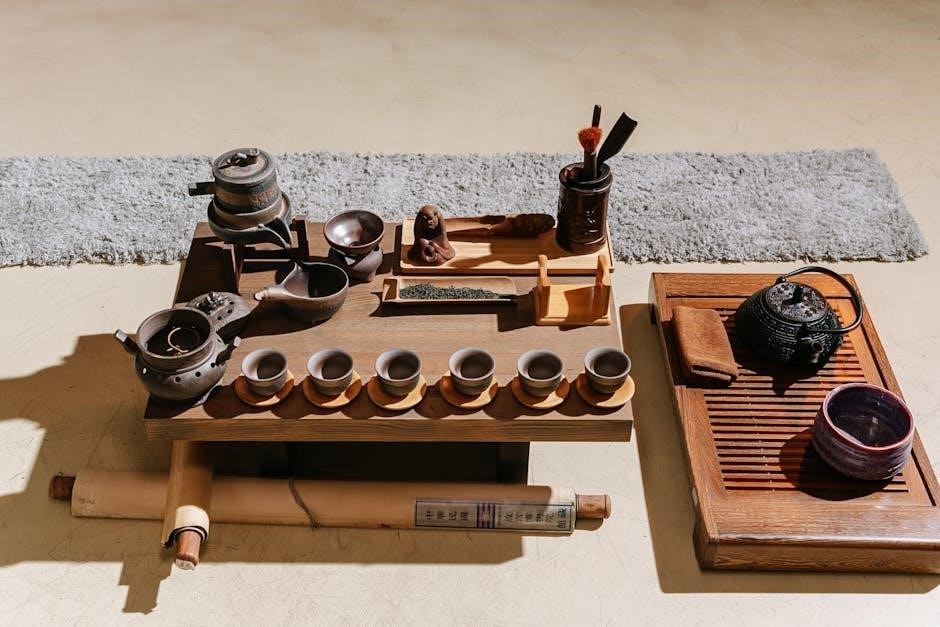
To brew the perfect cup of herbal tea, start by boiling fresh, filtered water in a kettle․ Preheat your teapot by rinsing it with a splash of hot water․ Add one teaspoon of loose herbs or one tea bag per cup to the pot․ Pour the boiling water over the herbs and let it steep for 5–7 minutes, depending on the type of herb․ Use a strainer to remove loose herbs or take out the tea bag․ Serve hot, optionally sweetening with honey or lemon․ Adjust steeping time to suit your desired strength and flavor․
Optimal Brewing Temperatures and Times
For the best flavor, herbal teas require specific brewing temperatures and steeping times․ Delicate herbs like chamomile or peppermint thrive at 190–212°F (88–100°C) for 5–7 minutes․ Root-based teas, such as ginger or dandelion, benefit from boiling water (212°F/100°C) and a slightly longer steep of 8–10 minutes․ Harder herbs like hibiscus or cinnamon may need up to 12 minutes․ Always use freshly drawn, filtered water for optimal taste․ Adjust steeping times based on desired strength and flavor profile․ Covering the pot during steeping helps retain heat and enhance infusion quality․ Experiment to find your perfect balance of temperature and time․
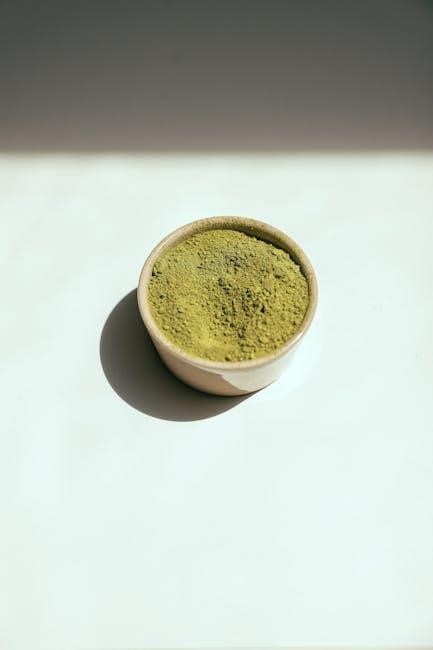
Herbal Teas for Specific Health Conditions
Herbal teas are widely used to address various health concerns, from colds and flu to stress and digestive issues, offering natural relief and promoting overall wellness safely․
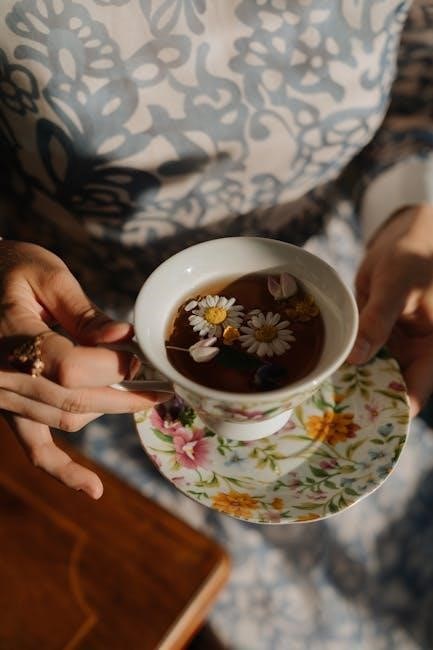
Herbal Teas for Cold and Flu Relief
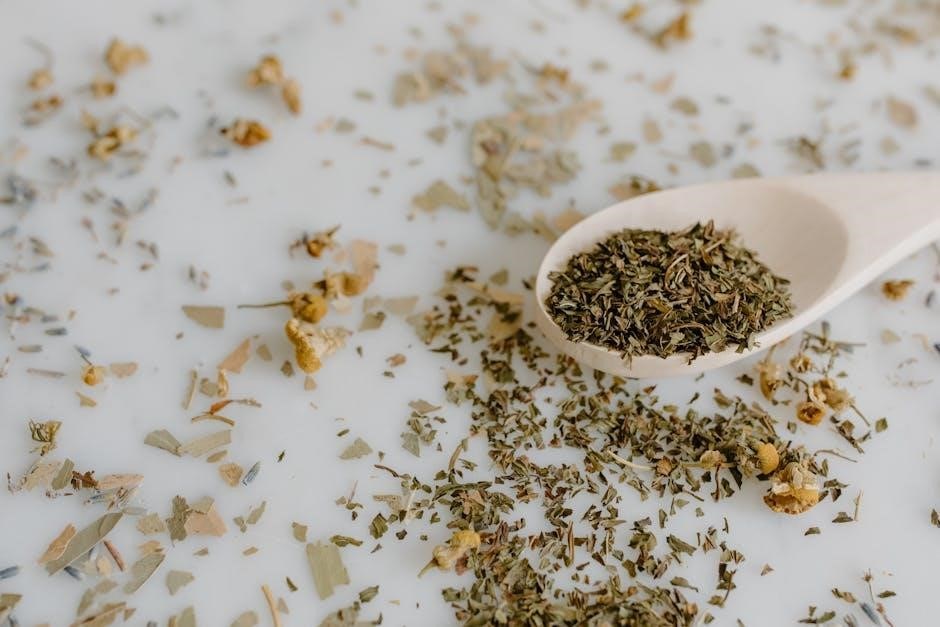
Herbal teas like echinacea, ginger, and peppermint are popular for alleviating cold and flu symptoms․ Echinacea boosts immunity, while ginger soothes sore throats and reduces inflammation․ Peppermint eases congestion and calms nausea․ These teas provide comforting relief without caffeine, making them suitable for all ages․ Additionally, elderberry tea is rich in antioxidants and has been traditionally used to shorten the duration of colds and flus․ Drinking these teas hot can help loosen mucus and provide much-needed hydration during illness․ Always opt for freshly brewed teas using high-quality herbs for the best results․
Herbal Teas for Anxiety and Stress Relief
Herbal teas like chamomile, lavender, and passionflower are renowned for their calming effects on the mind and body․ Chamomile tea, with its soothing properties, helps reduce anxiety and promotes relaxation․ Lavender tea calms nervous tension, while passionflower tea eases stress and restlessness․ Additionally, lemon balm and Ashwagandha teas are known to uplift mood and combat stress․ These teas work naturally to create a sense of tranquility, making them excellent choices for managing anxiety and stress․ Incorporating them into your daily routine can foster emotional balance and overall well-being without the need for caffeine or medication․
Herbal Teas for Digestive Health
Herbal teas are a natural solution for promoting digestive health and alleviating common issues like bloating and indigestion․ Chamomile tea soothes the stomach, reducing inflammation and calming digestive discomfort․ Peppermint tea, with its cooling properties, eases cramps and improves digestion․ Ginger tea is known for its anti-inflammatory effects, aiding in relieving nausea and stomach pain․ Fennel tea helps reduce gas and bloating while supporting overall gut health․ These teas provide a gentle, caffeine-free way to support the digestive system and maintain a healthy balance in the body․ Incorporating them into your routine can lead to long-term digestive well-being․
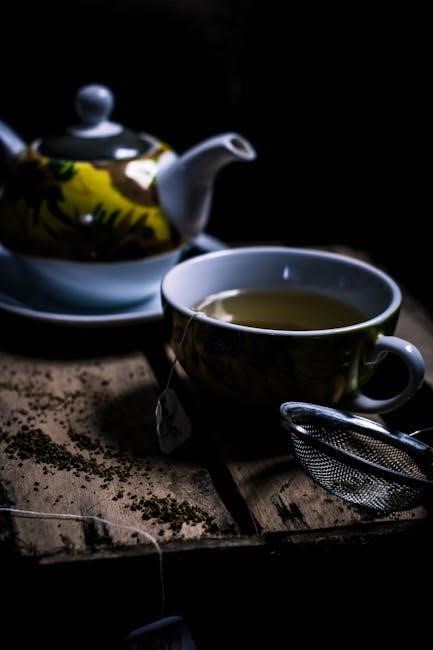
Safety Considerations
Herbal teas are generally safe but consult healthcare providers, especially during pregnancy or while on medication, as some teas may interact with health conditions or drugs․
Who Should Avoid Herbal Tea?
Certain individuals should avoid herbal tea, including pregnant women, those with specific medical conditions, and people taking medications that may interact with herbal compounds․ Pregnant women must be cautious as some teas can stimulate the uterus or affect hormone levels․ Additionally, individuals with allergies to specific plants or those undergoing chemotherapy should consult their healthcare provider before consumption․ While generally safe, herbal teas can pose risks for these groups, making professional advice essential to ensure safety and prevent adverse effects․
Pregnancy and Herbal Tea Safety
Pregnancy requires careful consideration when consuming herbal teas․ While some teas, like ginger and peppermint, may help with nausea, others like blue cohosh and pennyroyal can pose risks․ It’s crucial for expecting mothers to consult healthcare providers before drinking herbal teas, as certain herbs may stimulate the uterus or interfere with hormone levels․ Moderation and professional guidance are key to ensuring both mother and baby’s safety and well-being during this sensitive period․ Always prioritize medical advice to avoid potential complications․
Interactions with Medications
Herbal teas can interact with certain medications, potentially altering their effectiveness or causing adverse effects․ For instance, some herbs may interfere with blood thinners or diabetes medications, while others could amplify the effects of sedatives․ It’s essential to consult a healthcare provider before consuming herbal teas, especially if you’re on prescribed medication․ Certain herbs, like St․ John’s Wort, can reduce the efficacy of contraceptives and antidepressants․ Always disclose herbal tea usage to your doctor to avoid unintended health risks and ensure safe medication management․ Prioritizing professional advice can help prevent complications and guarantee optimal health outcomes․
Herbal tea offers a natural, flavorful way to enhance well-being, with diverse options catering to various tastes and health goals, making it a delightful addition to daily routines․
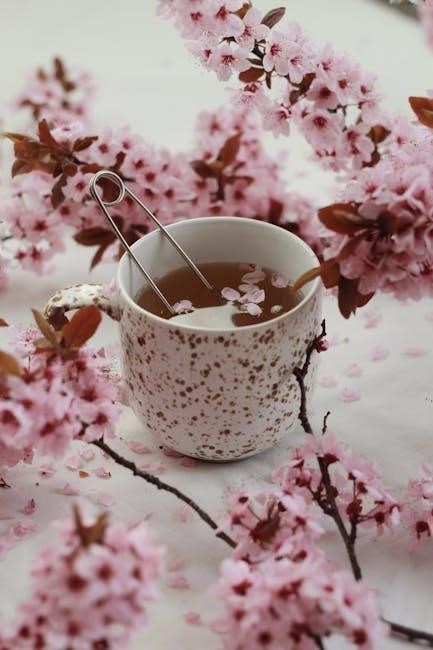
Final Thoughts on Herbal Tea
Herbal tea is a versatile and soothing beverage that has captured the hearts of many with its health-enhancing properties and diverse flavors․ From boosting immunity to calming the mind, it offers a natural way to nurture well-being․ With countless options like chamomile, peppermint, and hibiscus, there’s a tea for every mood and need․ While most are safe, mindful consumption, especially for sensitive groups like pregnant individuals, is key․ Embrace the world of herbal tea, explore its varieties, and let its gentle warmth bring balance and joy to your daily life․
Encouragement to Explore Herbal Tea Options
Exploring herbal teas is a journey of discovery, offering a world of flavors and benefits․ With so many varieties, from calming chamomile to invigorating ginger, there’s always something new to try․ Each tea provides unique health advantages, making it a natural way to enhance your well-being․ Whether you’re seeking relaxation, energy, or improved sleep, herbal teas have something to offer․ Experiment with different blends, enjoy the aroma, and savor the taste․ Embrace this ancient tradition, and let herbal teas become a delightful part of your daily routine, bringing balance and joy to your life․
